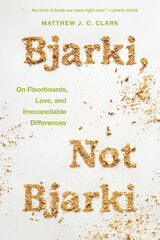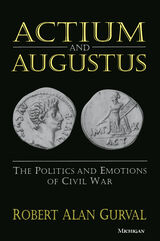
Actium and Augustus marks a turning point as well. Robert Alan Gurval's unusual approach is to examine contemporary views of the battle and its immediate political and social consequences. He starts with a consideration of the official celebration and public commemoration of the Actian victory and then moves on to other questions. What were the "Actian" monuments that Octavian erected on the battle site and later in Rome? What role did the Actian victory play in the political formation of the Principate and its public ideology? What was the response of contemporary poetry? Throughout, this volume concentrates on contemporary views of Actium and its results.
Written to include the general reader, Actium and Augustus presents a thoughtful examination of a complex period. All Greek and Latin quotations are translated, and extensive illustrations present graphic evidence about the issues Romans faced.
Robert Alan Gurval is Associate Professor of Classics, University of California, Los Angeles, and has been a recipient of the Rome Prize awarded by the American Academy in Rome.
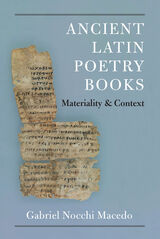
Before the invention of printing, all forms of writing were done by hand. For a literary text to circulate among readers, and to be transmitted from one period in time to another, it had to be copied by scribes. As a result, two copies of an ancient book were different from one another, and each individual book or manuscript has its own history. The oldest of these books, those that are the closest to the time in which the texts were composed, are few, usually damaged, and have been often neglected in the scholarship. Ancient Latin Poetry Books presents a detailed study of the oldest manuscripts still extant that contain texts by Latin poets, such as Virgil, Terence, and Ovid. Analyzing their physical characteristics, their script, and the historical contexts in which they were produced and used, this volume shows how manuscripts can help us gain a better understanding of the history of texts, as well as of reading habits over the centuries. Since the manuscripts originated in various places of the Latin-speaking world, Ancient Latin Poetry Books investigates the readership and reception of Latin poetry in many different contexts, such schools in the Egyptian desert, aristocratic circles in southern Italy, and the Christian élite in late antique Rome. The research also contributes to our knowledge about the use of writing and the importance of the written text in antiquity. This is an innovative approach to the study of ancient literature, one that takes the materiality of texts into consideration.


Polymetric gems, wistful elegies, and a lover’s prayer.
Catullus (Gaius Valerius, 84–54 BC), of Verona, went early to Rome, where he associated not only with other literary men from Cisalpine Gaul but also with Cicero and Hortensius. His surviving poems consist of nearly sixty short lyrics, eight longer poems in various metres, and almost fifty epigrams. All exemplify a strict technique of studied composition inherited from early Greek lyric and the poets of Alexandria. In his work we can trace his unhappy love for a woman he calls Lesbia; the death of his brother; his visits to Bithynia; and his emotional friendships and enmities at Rome. For consummate poetic artistry coupled with intensity of feeling, Catullus’ poems have no rival in Latin literature.
Tibullus (Albius, ca. 54–19 BC), of equestrian rank and a friend of Horace, enjoyed the patronage of Marcus Valerius Messalla Corvinus, whom he several times apostrophizes. Three books of elegies have come down to us under his name, of which only the first two are authentic. Book 1 mostly proclaims his love for “Delia,” Book 2 his passion for “Nemesis.” The third book consists of a miscellany of poems from the archives of Messalla; it is very doubtful whether any come from the pen of Tibullus himself. But a special interest attaches to a group of them which concern a girl called Sulpicia: some of the poems are written by her lover Cerinthus, while others purport to be her own composition.
The Pervigilium Veneris, a poem of not quite a hundred lines celebrating a spring festival in honor of the goddess of love, is remarkable both for its beauty and as the first clear note of romanticism which transformed classical into medieval literature. The manuscripts give no clue to its author, but recent scholarship has made a strong case for attributing it to the early fourth-century poet Tiberianus.

The assimilated assimilator.
Quintus Ennius (239–169 BC), widely regarded as the father of Roman literature, was instrumental in creating a new Roman literary identity and inspired major developments in Roman religion, social organization, and popular culture. Born in the Calabrian town of Rudiae in Magna Graecia, Ennius claimed descent from Messapus, eponymous hero of Messapia, and was uncle to the tragic dramatist Pacuvius. Brought in 204 from Sardinia to Rome in the entourage of Cato, Ennius took up independent residence on the Aventine and, fluent in his native Oscan as well as Greek and Latin, became one of the first teachers to introduce Greek learning to Romans through public readings of Greek and Latin texts. Transcending partisan interests, Ennius cultivated familiar relationships with several of Rome’s most distinguished families, including that of Marcus Fulvius Nobilior, through whose patronage he eventually attained Roman citizenship.
Best known for domesticating Greek epic and drama, Ennius also pursued a wide range of literary endeavors and, with the apparent exception of comedy, found success in all of them. He thus played a major role in setting Latin literature on the assimilationist course that was to be its hallmark throughout the Republican period. His tragedies were long regarded as classics of the genre, and his Annals gave Roman epic its canonical shape and pioneered many of its most characteristic features. Other endeavors included philosophical works in prose and verse, epigrams, didactic poems, dramas on Roman themes (praetextae), and occasional poetry that informed the later development of satire.
This two-volume edition of Ennius, which inaugurates the Loeb series Fragmentary Republican Latin, replaces that of Warmington in Remains of Old Latin, Volume I and offers fresh texts, translations, and annotation that are fully current with modern scholarship.

The assimilated assimilator.
Quintus Ennius (239–169 BC), widely regarded as the father of Roman literature, was instrumental in creating a new Roman literary identity and inspired major developments in Roman religion, social organization, and popular culture. Born in the Calabrian town of Rudiae in Magna Graecia, Ennius claimed descent from Messapus, eponymous hero of Messapia, and was uncle to the tragic dramatist Pacuvius. Brought in 204 from Sardinia to Rome in the entourage of Cato, Ennius took up independent residence on the Aventine and, fluent in his native Oscan as well as Greek and Latin, became one of the first teachers to introduce Greek learning to Romans through public readings of Greek and Latin texts. Transcending partisan interests, Ennius cultivated familiar relationships with several of Rome’s most distinguished families, including that of Marcus Fulvius Nobilior, through whose patronage he eventually attained Roman citizenship.
Best known for domesticating Greek epic and drama, Ennius also pursued a wide range of literary endeavors and, with the apparent exception of comedy, found success in all of them. He thus played a major role in setting Latin literature on the assimilationist course that was to be its hallmark throughout the Republican period. His tragedies were long regarded as classics of the genre, and his Annals gave Roman epic its canonical shape and pioneered many of its most characteristic features. Other endeavors included philosophical works in prose and verse, epigrams, didactic poems, dramas on Roman themes (praetextae), and occasional poetry that informed the later development of satire.
This two-volume edition of Ennius, which inaugurates the Loeb series Fragmentary Republican Latin, replaces that of Warmington in Remains of Old Latin, Volume I and offers fresh texts, translations, and annotation that are fully current with modern scholarship.

Three foundational Roman poets.
The Loeb Classical Library series Fragmentary Republican Latin continues with three highly influential pioneers in the creation and development of Latin poetry.
Livius Andronicus (born ca. 292 BC) was regarded by the Romans as the founder of Latin literature, introducing tragedy and comedy, adapting Homer’s Odyssey into Saturnian verse, and composing a nationally important hymn for Juno. A meeting place for writers and actors was established in the temple of Minerva on the Aventine in recognition of his poetic achievements.
Naevius (born ca. 280–260), though most famous for his comedies, also wrote tragedy and epic. He innovated by incorporating Roman material into his Greek models and writing on Roman subjects independently. The inventor of the fabula praetexta, drama on a Roman theme, he also introduced new topics to Roman tragedy, especially those relating to Troy, and his Punic War, the first epic on a Roman historical subject, was a longtime school text and a favorite of Augustus.
Caecilius (born probably in the 220s), a friend of the older Ennius, excelled at comedy, of which he was Rome’s leading exponent during his career, and was so considered by posterity. Caecilius continued the Naevian practice of inserting Roman allusions into his works and was admired by later critics particularly for his substantive and well-constructed plots, and for his ability to arouse emotion.
The texts are based on the most recent and reliable editions of the source authors and have been revised, freshly translated, and amply annotated in light of current scholarship.
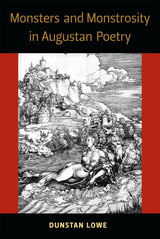
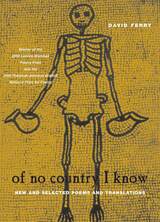
"Though Ferry is perhaps best known for his eloquent translations of Horace and Virgil, "Of No Country I Know" demonstrates that he deserves acclaim for his own poetry as well."—Carmela Ciuraru, New York Times Book Review
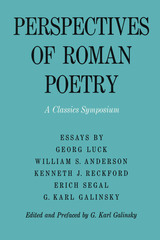
Written by leading specialists, the essays in Perspectives of Roman Poetry seek to provide a broad range of readers with a good understanding of some essential aspects of major Roman poets and poetic genres. The value of the essays is enhanced, for comparative purposes, by their extensive reference to modern authors. such as Shakespeare and Tolkien. For the modern reader, Latin quotations are accompanied by effective English translations.
The essays and their authors are as follows:
- "The Woman's Role in Latin Love Poetry," by Georg Luck
- "Autobiography and Art in Horace," by William S. Anderson
- "Some Trees in Virgil and Tolkien," by Kenneth J. Reckford
- "The Business of Roman Comedy," by Erich Segal
- "Ovid's Metamorphosis of Myth," by G. Karl Galinsky
Perspectives of Roman Poetry resulted from a symposium held at the University of Texas at Austin in 1972. These essays offer different and, in some cases, heterodox interpretations that will serve as a basis for future discussions.
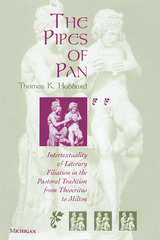
Pastoral poetry highlights the didactic relationship of older and younger shepherds, whether as rivals or as patron and successor. As such it is an ideal form for young poets' self-representation vis-à-vis their elders, whose work they simultaneously appropriated and transformed, even as the elder poets were represented in the new texts. This influence is reenacted in every generation: Theocritus vs. his Alexandrian forebears, Vergil vs. Theocritus, Calpurnius vs. Vergil, Nemesianus vs. Vergil and Calpurnius, Petrarch vs. Vergil, Boccaccio vs. Petrarch, Spenser vs. Vergil, along with Chaucer and Milton vs. Spenser.
The Pipes of Pan combines multiple strands of contemporary intertextual theory with reception aesthetics and Harold Bloom's theory of intersubjective conflict between generations of poets. It also provides one of the first systematic studies of intertextual and intersubjective dynamics within a whole genre.
This work will be of interest to classicists, students of literary theory, comparative literature, medieval and Renaissance literature, Italian humanism, and English literature of the sixteenth and seventeenth centuries. All texts are translated.
Thomas Hubbard is Associate Professor of Classics, University of Texas at Austin.

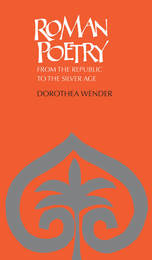
Meshing her own wit, verve, and gusto with that of the Roman poets she translates, Dorothea Wender strips both the cloak of awe and the dusty mantle of boredom from the classics.
Available for the first time in paper, these English verse translations of the major classical Roman poets feature hefty selections from the savage urban satire of Juvenal, the moving philosophy of Lucretius, the elegance of Horace, the grace and humor of Catullus, the grave music of Virgil, the passion of Propertius, the sexy sophistication of Ovid, and the obscenity of Martial.
Noting Wender’s “candor,” the Classical Outlook reported that in “20th-century terms, she makes the poems lively and pertinent.”
The Boston Globe said, “The conciseness is astonishing, the information [in the introductions to each poet] provocative. The freshness of the selections should do much to augment the audience for these poets and may even inspire examination of the originals.”
The best advice came from Wender herself: “Read these good poems.”
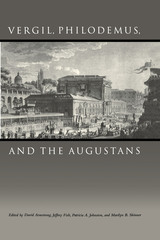
The Epicurean teacher and poet Philodemus of Gadara (c. 110-c. 40/35 BC) exercised significant literary and philosophical influence on Roman writers of the Augustan Age, most notably the poets Vergil and Horace. Yet a modern appreciation for Philodemus' place in Roman intellectual history has had to wait on the decipherment of the charred remains of Philodemus' library, which was buried in Herculaneum by the eruption of Vesuvius in 79 AD. As improved texts and translations of Philodemus' writings have become available since the 1970s, scholars have taken a keen interest in his relations with leading Latin poets.
The essays in this book, derived from papers presented at the First International Symposium on Philodemus, Vergil, and the Augustans held in 2000, offer a new baseline for understanding the effect of Philodemus and Epicureanism on both the thought and poetic practices of Vergil, Horace, and other Augustan writers. Sixteen leading scholars trace his influence on Vergil's early writings, the Eclogues and the Georgics, and on the Aeneid, as well as on the writings of Horace and others. The volume editors also provide a substantial introduction to Philodemus' philosophical ideas for all classicists seeking a fuller understanding of this pivotal figure.
READERS
Browse our collection.
PUBLISHERS
See BiblioVault's publisher services.
STUDENT SERVICES
Files for college accessibility offices.
UChicago Accessibility Resources
home | accessibility | search | about | contact us
BiblioVault ® 2001 - 2024
The University of Chicago Press




